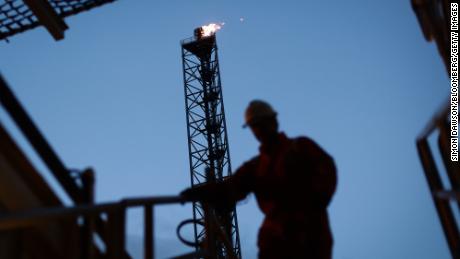UN Report: World fossil fuel usage headed in the wrong direction
London (CNN Business)Even as the world debates the end of fossil fuels at COP26 in Glasgow, OPEC and its allies are discussing whether to pump more oil to tame soaring energy prices that are fueling global inflation and hurting vulnerable households.
Energy ministers from major oil and gas producers, including Saudi Arabia and Russia, meeting virtually on Thursday, are under pressure from big customers such as the United States to increase production by more than the 400,000 barrels per day they had already planned.
Speaking at the climate summit in Glasgow on Tuesday, President Joe Biden said that rising gasoline prices are “a consequence” of “the refusal of Russia or the OPEC nations to pump more oil.”
“We’ll see what happens on that score sooner than later,” added Biden.
The price of Brent crude oil, the global benchmark, has doubled over the past year to $83.26 per barrel as the global economy rebounds from its pandemic slump. Bank of America predicts that prices will zoom even higher and hit $120 per barrel by June 2022.
Soaring oil prices are dampening the economic recovery at a crucial moment, and elevated gasoline prices could have political ramifications for Democrats heading into next year’s midterm elections. US gas prices have surged to a seven-year high of $3.40 a gallon nationally and are flirting with $4 in Nevada, Washington and Oregon. Gasoline and diesel prices have hit record highs in part of Europe and the United Kingdom too.
Natural gas prices are also soaring, piling on pain for low income households around the world as they turn on their heating at the start of the northern hemisphere winter.
OPEC members produce about 40% of the world’s crude oil. OPEC has been coordinating production decisions in recent years with other major suppliers, including Russia, as part of a larger grouping called OPEC+.
“The external flex on OPEC+ from oil producing countries is mounting, especially from the United States, and has led to speculation that if the alliance itself doesn’t add supply to the market, the United States, possibly in coordination with other states, will be forced to quell the oil price rally by releasing crude from strategic reserves,” said Rystad Energy analyst Louise Dickson.
Last month, Energy Secretary Jennifer Granholm suggested tapping the US Strategic Petroleum Reserve was under active consideration — before the Energy Department later walked back her comments by clarifying there was no “immediate plan” to do so.
Biden’s call for OPEC+ countries to increase production coincides with US attempts at COP26 to accelerate the shift away from fossil fuels in order to prevent a climate catastrophe. The International Energy Agency has said that fresh oil and gas development must stop if the world is going to limit warming to 1.5 degrees Celsius and avoid the worst effects of the climate crisis.
In an announcement at COP26, seven countries and 21 other parties, including banks and cities, pledged to end the use of coal. Ukraine, Chile, Singapore, Mauritius, Azerbaijan, Slovenia and Estonia joined the Powering Past Coal Alliance, which obliges members to stop building new coal projects and phase out coal by 2030 for developed nations, and 2040 for developing countries.
And at least 20 countries have agreed to end financing for fossil fuel projects abroad, a UK official told CNN, in a deal expected to be announced Thursday. It remains unclear whether the United States will join that agreement.
“On the surface, it seems like an irony, but the truth of the matter is … the idea we’re going to be able to move to renewable energy overnight and … from this moment on, not use oil or not use gas or not use hydrogen is just not rational,” Biden told reporters on Sunday.
— Matt Egan contributed reporting.
Source: Read Full Article



